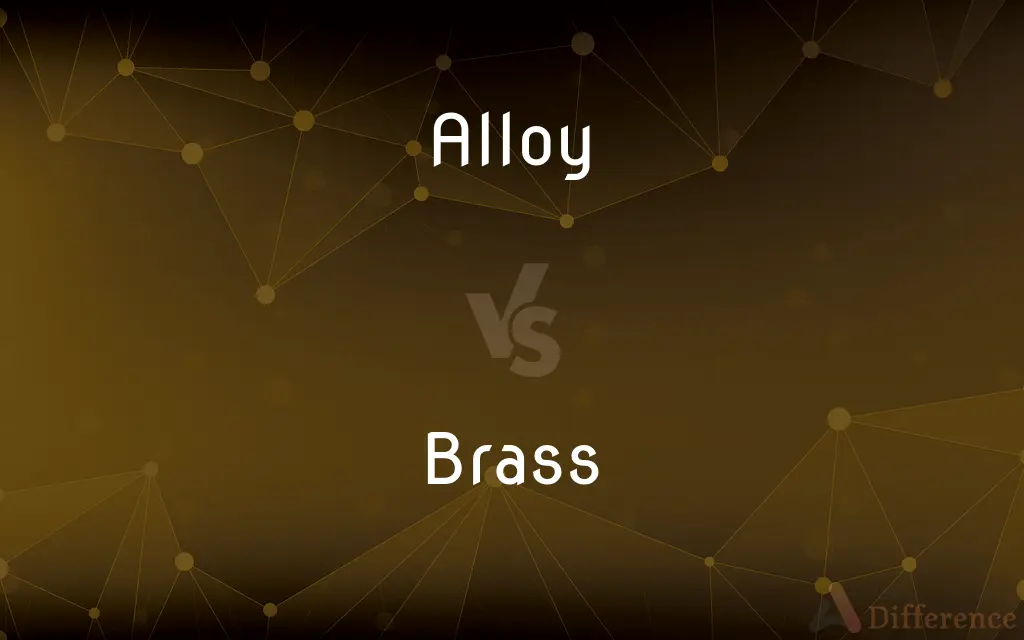Alloy vs. Brass — What's the Difference?
By Urooj Arif & Fiza Rafique — Updated on April 16, 2024
"Alloy" is a general term for a mixture of metals, whereas "brass" specifically refers to an alloy primarily made of copper and zinc, often used for its acoustic properties.

Difference Between Alloy and Brass
Table of Contents
ADVERTISEMENT
Key Differences
An alloy is a metallic substance composed of two or more elements, at least one of which is a metal, designed to improve material properties. Whereas brass is a specific type of alloy that combines copper and zinc, known for its durability and corrosion resistance.
Alloys can be created using a variety of base metals like iron, aluminum, or copper, each chosen for specific traits like strength or conductivity. On the other hand, brass specifically uses copper for its base, leveraging copper’s thermal and electrical conductivity.
The composition of an alloy can vary widely, intended to produce qualities like increased strength, decreased melting point, or resistance to corrosion. In contrast, brass generally contains 55% to 90% copper, with zinc added to improve strength and ductility.
Alloys are used across a broad spectrum of applications, from aerospace to automotive to electronics, depending on their properties. Brass, however, is particularly favored in musical instruments, plumbing, and decorative items due to its acoustic properties and aesthetic appeal.
The production methods for alloys can differ significantly, involving techniques like blending, melting, or sintering different metals. Conversely, brass is typically produced by directly melting copper and zinc together, ensuring a uniform and consistent mixture.
ADVERTISEMENT
Comparison Chart
Base Metals
Can include iron, aluminum, copper
Primarily copper, with zinc added
Typical Composition
Varies widely
55%-90% copper, remainder zinc
Key Properties
Strength, malleability, conductivity
Durability, corrosion resistance, acoustic properties
Common Uses
Aerospace, automotive, electronics
Musical instruments, plumbing, decoration
Production Methods
Blending, melting, sintering
Melting copper and zinc together
Compare with Definitions
Alloy
A mixture of two or more metals.
Stainless steel is an alloy of iron and chromium.
Brass
Used in musical instruments.
Trumpets are typically made of brass for its acoustic properties.
Alloy
Can include non-metallic elements.
Steel is an alloy that includes carbon.
Brass
An alloy of copper and zinc.
Brass is commonly used in door fixtures for its appearance.
Alloy
Varies in composition.
Solder, an alloy, can vary in the proportion of tin and lead.
Brass
Resists corrosion.
Marine hardware often uses brass to resist saltwater corrosion.
Alloy
Used in various industries.
Cobalt alloys are used in turbine blades.
Brass
Known for durability.
Brass fittings are used in plumbing for their long life.
Alloy
Created to enhance properties.
Aluminum alloys are used in aircraft for their light weight.
Brass
Decorative and practical.
Brass is a popular choice for decorative frames.
Alloy
An alloy is an admixture of metals, or a metal combined with one or more other elements. For example, combining the metallic elements gold and copper produces red gold, gold and silver becomes white gold, and silver combined with copper produces sterling silver.
Brass
Brass is an alloy of copper and zinc, in proportions which can be varied to achieve varying mechanical, electrical, and chemical properties. It is a substitutional alloy: atoms of the two constituents may replace each other within the same crystal structure.
Alloy
A metallic solid or liquid that is composed of a homogeneous mixture of two or more metals or of metals and nonmetal or metalloid elements, usually for the purpose of imparting or increasing specific characteristics or properties
Brass is an alloy of zinc and copper.
Brass
A yellowish alloy of copper and zinc, sometimes including small amounts of other metals, but usually 67 percent copper and 33 percent zinc.
Alloy
A mixture; an amalgam
"Television news has ... always been an alloy of journalism and show business" (Bill Moyers).
Brass
Ornaments, objects, or utensils made of this alloy.
Alloy
The relative degree of mixture with a base metal; fineness.
Brass
The section of a band or an orchestra composed of brass instruments.
Alloy
Something added that lowers value or purity.
Brass
Brass instruments or their players considered as a group.
Alloy
To combine (metals) to form an alloy.
Brass
A memorial plaque or tablet made of brass, especially one on which an effigy is incised.
Alloy
To combine; mix
Idealism that was alloyed with political skill.
Brass
A bushing or similar lining for a bearing, made from a copper alloy.
Alloy
To debase by the addition of an inferior element.
Brass
(Informal) Bold self-assurance; effrontery.
Alloy
A metal that is a combination of two or more elements, at least one of which is a metal.
Brass
(Slang) High-ranking military officers or other high officials.
Alloy
(archaic) A metal of lesser value, mixed with a metal of greater value.
Gold without alloy
Brass
Chiefly British Money.
Alloy
An admixture; something added which stains, taints etc.
Brass
(uncountable) A metallic alloy of copper and zinc used in many industrial and plumbing applications.
Alloy
(figurative) Fusion, marriage, combination.
Brass
A memorial or sepulchral tablet usually made of brass or latten
Alloy
To mix or combine; often used of metals.
Brass
Fittings, utensils, or other items made of brass
Alloy
To reduce the purity of by mixing with a less valuable substance.
To alloy gold with silver or copper, or silver with copper
Brass
(music) A class of wind instruments, usually made of metal (such as brass), that use vibrations of the player's lips to produce sound; the section of an orchestra that features such instruments
Alloy
(figurative) To impair or debase by mixture.
To alloy pleasure with misfortunes
Brass
Spent shell casings (usually made of brass); the part of the cartridge left over after bullets have been fired.
Alloy
Any combination or compound of metals fused together; a mixture of metals; for example, brass, which is an alloy of copper and zinc. But when mercury is one of the metals, the compound is called an amalgam.
Brass
(uncountable) The colour of brass.
Alloy
The quality, or comparative purity, of gold or silver; fineness.
Brass
High-ranking officers.
The brass are not going to like this.
The brass is not going to like this.
Alloy
A baser metal mixed with a finer.
Fine silver is silver without the mixture of any baser metal. Alloy is baser metal mixed with it.
Brass
A brave or foolhardy attitude; impudence.
You've got a lot of brass telling me to do that!
Alloy
Admixture of anything which lessens the value or detracts from; as, no happiness is without alloy.
Brass
Money.
Alloy
To reduce the purity of by mixing with a less valuable substance; as, to alloy gold with silver or copper, or silver with copper.
Brass
Inferior composition.
Alloy
To mix, as metals, so as to form a compound.
Brass
A brass nail; a prostitute.
Alloy
To abate, impair, or debase by mixture; to allay; as, to alloy pleasure with misfortunes.
Brass
Made of brass, of or pertaining to brass.
Alloy
To form a metallic compound.
Gold and iron alloy with ease.
Brass
Of the colour of brass.
Alloy
A mixture containing two or more metallic elements or metallic and nonmetallic elements usually fused together or dissolving into each other when molten;
Brass is an alloy of zinc and copper
Brass
(informal) Impertinent, bold: brazen.
Alloy
The state of impairing the quality or reducing the value of something
Brass
(slang) Bad, annoying; as wordplay applied especially to brass instruments.
Alloy
Lower in value by increasing the base-metal content
Brass
Of inferior composition.
Alloy
Make an alloy of
Brass
(slang) Brass monkey; cold.
Brass
(transitive) To coat with brass.
Brass
An alloy (usually yellow) of copper and zinc, in variable proportion, but often containing two parts of copper to one part of zinc. It sometimes contains tin, and rarely other metals.
Brass
A journal bearing, so called because frequently made of brass. A brass is often lined with a softer metal, when the latter is generally called a white metal lining. See Axle box, Journal Box, and Bearing.
Brass
Coin made of copper, brass, or bronze.
Provide neither gold, nor silver, nor brass in your purses, nor scrip for your journey.
Brass
Impudence; a brazen face.
Brass
Utensils, ornaments, or other articles of brass.
The very scullion who cleans the brasses.
Brass
A brass plate engraved with a figure or device. Specifically, one used as a memorial to the dead, and generally having the portrait, coat of arms, etc.
Brass
Lumps of pyrites or sulphuret of iron, the color of which is near to that of brass.
Brass
An alloy of copper and zinc
Brass
A wind instrument that consists of a brass tube (usually of variable length) blown by means of a cup-shaped or funnel-shaped mouthpiece
Brass
The persons (or committees or departments etc.) who make up a body for the purpose of administering something;
He claims that the present administration is corrupt
The governance of an association is responsible to its members
He quickly became recognized as a member of the establishment
Brass
Impudent aggressiveness;
I couldn't believe her boldness
He had the effrontery to question my honesty
Brass
An ornament or utensil made of brass
Brass
The section of a band or orchestra that plays brass instruments
Brass
A memorial made of brass
Common Curiosities
What defines an alloy?
A metallic mixture of two or more elements.
Can brass be considered a type of alloy?
Yes, it is a specific type of copper-based alloy.
What is brass mainly used for?
Musical instruments, plumbing, and decorations.
What is the significance of zinc in brass?
It increases strength and ductility.
Are all alloys metallic?
Yes, they include at least one metal element.
What makes brass ideal for musical instruments?
Its unique acoustic properties.
Why is copper used in brass?
For its thermal and electrical conductivity.
Is there a limit to how many metals can be in an alloy?
No, alloys can consist of multiple metals.
What industries rely heavily on alloys?
Aerospace, automotive, and electronics.
What are the benefits of using alloys?
Improved strength, corrosion resistance, and specific properties.
Can alloys contain non-metal elements?
Yes, such as carbon in steel.
Why is brass favored for decorative items?
For its aesthetic appeal and durability.
How does the composition of brass affect its properties?
Higher copper content enhances conductivity and color.
How is brass different from other copper alloys?
It specifically uses zinc as its secondary metal.
How is brass manufactured?
By melting copper and zinc together.
Share Your Discovery

Previous Comparison
Separation vs. Segregation
Next Comparison
Controversial vs. DisputableAuthor Spotlight
Written by
Urooj ArifUrooj is a skilled content writer at Ask Difference, known for her exceptional ability to simplify complex topics into engaging and informative content. With a passion for research and a flair for clear, concise writing, she consistently delivers articles that resonate with our diverse audience.
Co-written by
Fiza RafiqueFiza Rafique is a skilled content writer at AskDifference.com, where she meticulously refines and enhances written pieces. Drawing from her vast editorial expertise, Fiza ensures clarity, accuracy, and precision in every article. Passionate about language, she continually seeks to elevate the quality of content for readers worldwide.













































